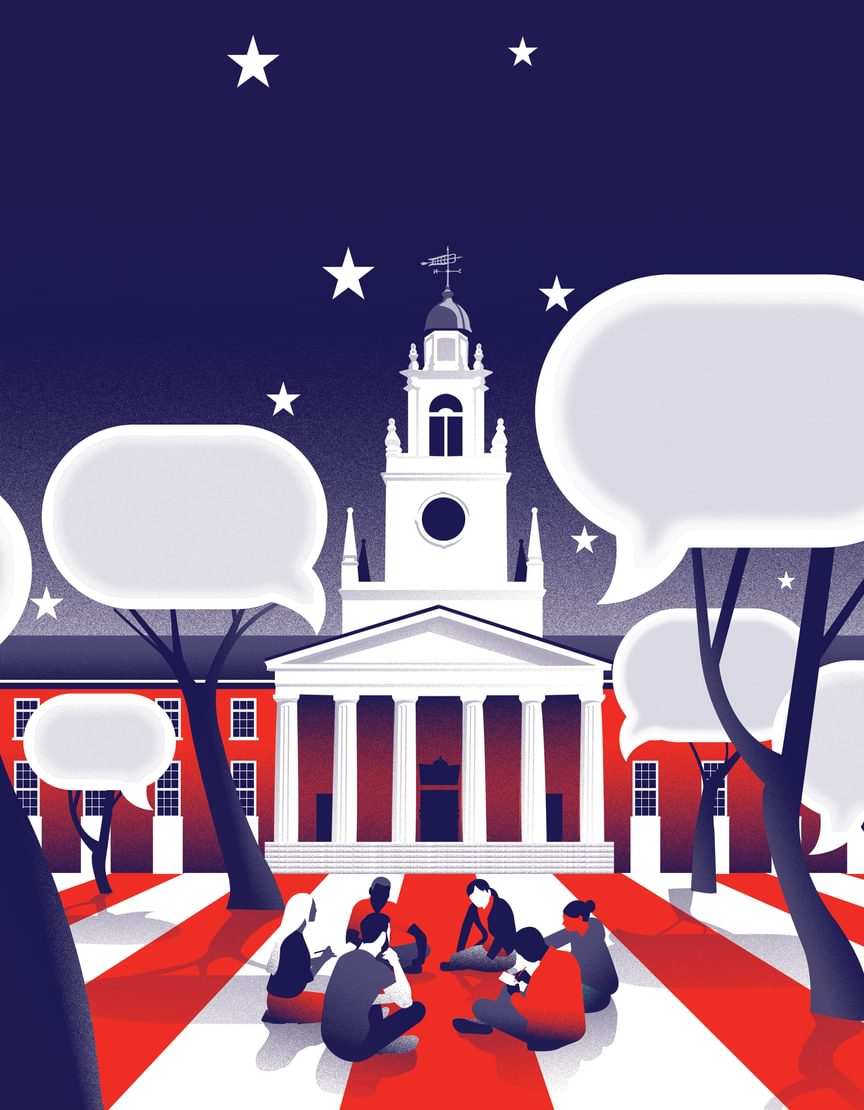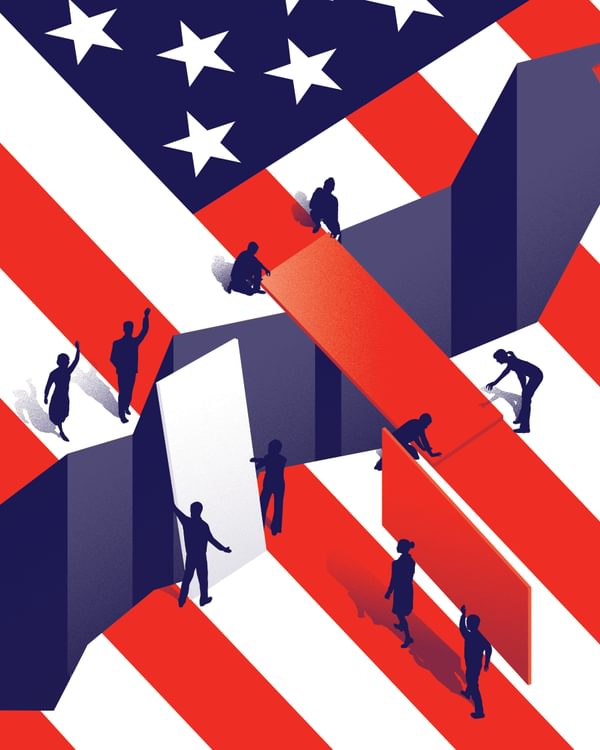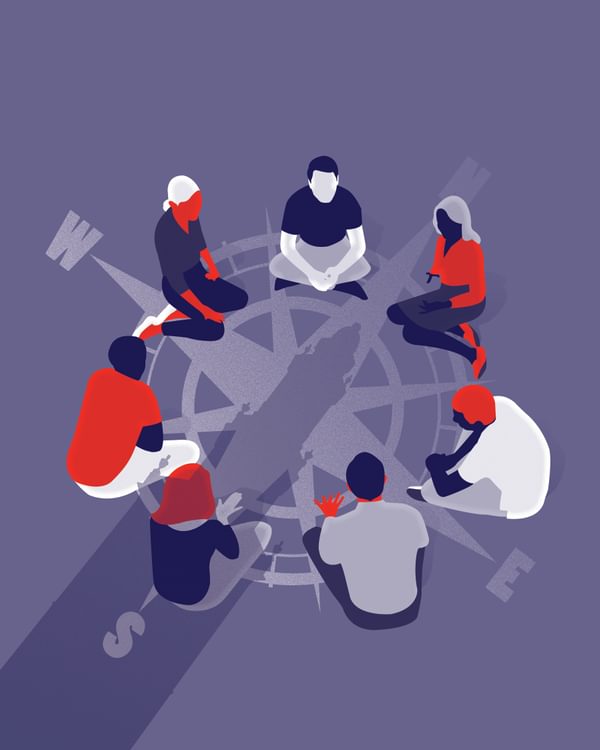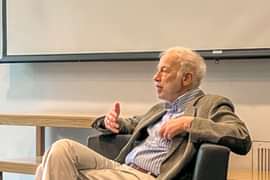
December 23, 2024
Common divide
Andover works to encourage civil discourseby Allyson Irish
As the United States prepares to inaugurate its 47th president amidst a turbulent cultural backdrop, Andover is working to encourage civil discourse—for the good of its students, the Andover community, and democracy writ large.
The students slowly stream into Bulfinch Hall Room 107, water bottles and laptops in hand. They sit around a large wooden table and wait for the teacher to begin.
It’s a late start at 7:50 p.m., unusual for Andover’s regimented schedule. But this class is different. Offered only to seniors, The Will of the People is the most recent offering of The William Sloane Coffin Jr. ’42 Colloquium Series. Organized by English instructor Leon Calleja, the series explores all aspects of popular sovereignty through a series of interdisciplinary classes taught by different teachers and guest speakers. During the term, students will participate in classes such as Personality and Identity Politics, The Practice of Democratic Citizenship, and Freedom.
Tonight, history instructor Matt Hession discusses the American political landscape of the late 1960s and early ’70s prior to the Supreme Court’s landmark 1976 ruling on campaign finance regulations.
It’s impossible not to recognize the similarities to the current zeitgeist. Divisiveness. A fracturing among and within political parties. Mistrust in government and social institutions. Guided by insights and questions from Hession and Calleja, students are encouraged to think about the many levers involved in a working democracy.
“A major takeaway of the course is having students think about what legitimizes democracy, to see that collective governance in general is hard work and shouldn’t be taken for granted,” says Calleja. “Democracy has always been a struggle that requires an active, inquisitive, and critically minded citizenry.”
The Struggle is Real
There’s no question 2024 was a big year. In terms of the sheer number of elections, more than 60 nations across the globe made decisions on leadership, signaling the potential for massive geopolitical shifts. In the United States, citizens continue to grapple with myriad hot-button issues, ranging from abortion rights and immigration to health care and freedom of speech.
All of this is happening amidst a backdrop of distrust and unease. The Pew Research Center, which has been polling Americans since 1958, states that public trust in government “is near historic lows.”
When it comes to education, the numbers are equally dismal. Pew data from April 2024 show that one-third of American public-school teachers in grades K–12 trust neither Democrats nor Republicans to manage public education.
“We’ve always been polarized,” says Jane Coaston, a contributing opinion writer for the New York Times who focuses on conservatism and the GOP. “What is different today is that people’s politics have become their personalities.”
Through her writing and podcast, Coaston—who was an All-School Meeting speaker in October—posits that this “cult of personality” has been amplified by the use of social media. Online discussion forums in particular (like X and Reddit) have further fanned the flames of divisiveness.
“Posting online has become a performance that you would probably not do in any other space,” she notes. “When you are in person, you can read expression and there is greater context. But online you are praised and algorithmically boosted for being the most extreme version of who you are.”
Students understand this all too well. A board member of Andover’s Political Union (APU), Pragun Seth ’25 says that he and his peers are acutely aware of the inherent structural polarization within social media that includes clickbait and weaponized information.
And their wariness extends beyond social platforms.
“Nowadays, traditional media outlets have become so biased and their quality has degraded so much that I find myself fact-checking each conclusion that is presented to me,” Seth says.
Do media outlets care about these perceptions? Does it factor into their reporting, choice of guests, or their coverage?
 Illustrations by Neil Webb
Illustrations by Neil Webb
A political reporter for nearly 30 years, John Berman ’90 says that objectivity and maintaining a civil conversation has always been—and remains—the goal of journalism. But that goal has become increasingly difficult to achieve.
“Every interview I go into, I have a plan to get as much substance as I can before the guest invariably lays the punches or does the sensational thing,” says Berman, co-anchor of CNN News Central. “We want to be compelling, but our goal is always journalism—even though the culture has become more addicted to shiny objects.”
Berman cut his political teeth covering the 1996 presidential campaign of Bill Clinton v. Bob Dole; four years later he spent 18 months on the road with candidate and fellow PA alumnus George W. Bush ’64, who eventually became the 43rd president.
At that time, recalls Berman, use of the internet and social media for political campaigns was still somewhat novel. “Information wasn’t being blasted out every second of every day,” he says. Berman acknowledges that while the proliferation of real-time content available now is generally a good thing, it requires a high level of vigilance to assess sources and react respectfully and responsibly.
“Andover taught me how to ask questions and search for answers. I also learned how to make a point clearly and listen. You have to be willing to listen, especially to people you disagree with.”
Getting to Dialogue
How can we expect to teach the next generation of leaders about constructive dialogue if adults are not able to model this behavior themselves? It’s an important question and one that Head of School Raynard S. Kington, MD, PhD, P’24, ’27, addressed with the community at the start of the academic year.
Andover’s approach to civil discourse, Kington said, leans heavily on its values and mission to “prepare students to become engaged members of society.” Kington acknowledged that this can be difficult when “society seems captivated by the most extreme viewpoints and loudest voices.” Yet that is precisely what the Academy wants students to do—identify core issues, deconstruct multiple perspectives, and ultimately learn from one another.
“Civil discourse leads to deeper understanding,” Kington said. “It is an essential component of an intellectual community, and it is crucial during these turbulent times.”
Andover has always provided a place and space for difficult conversations, and those efforts amped up this past fall with various opportunities for students and campus adults to develop skills, test out various approaches to contentious scenarios, and hear from speakers with diverse political and ideological viewpoints.
Derek Curtis is the faculty advisor to the APU, PA Dems, and the Andover Conservative Club. When he met with the APU board over the summer, students explicitly asked to have a variety of viewpoints and perspectives presented through campus guest speakers. “They want more people talking,” he says, acknowledging that students not only recognize today’s heated rhetoric but also see how it is used to purposely weaponize discourse.
“The hope is that in talking we turn down the volume on extremity,” says Curtis. “The conversation itself is its own win. The worst thing we can do is go off in our own silos.”
Students have noticed. In October, The Phillipian published no fewer than five commentaries on topics like “Gender in Elections” and “Bringing Politics to Andover.” Writing about the need for a new approach to diplomacy, Grace Kim ’27 referred to her interview with John Marks ’61, a recent Tang Institute speaker and a visionary in the fields of diplomacy and peacemaking (see story, page 12).
“As the familiar world begins to give way to uncertainty, it is clear that we must adapt,” Kim writes. “…relying solely on government-to-government negotiations is simply insufficient in the face of the more complex and intense conflicts endangering our world today. The integration of the adaptable, human-centered approach of [diplomacy] can forge a new framework of peacebuilding capable of withstanding the volatility of our changing world.”
Katerina Browder ’26, another APU board member, agrees. Browder says that educational institutions like Andover should prioritize creating environments where students can “express their views openly without fear of social or academic consequences” and that teachers in particular play an important role by “modeling neutrality in political conversations and…teaching students how to engage in respectful conversation about difficult issues.”
Talking the talk
During an October tabletop exercise in Kemper Auditorium, campus adults gathered to consider a list of “micro dilemmas” with assistance from Harvard’s EdEthics Program, which provides research and training for educators around complex ethical decisions.
Seated around a table, instructors and staff reviewed a scenario that involved a teacher who wanted to include a student’s conservative viewpoint in a class where the majority held similar liberal perspectives. What to do?
The group discussed different types of language to use with the class and with the specific student and how to approach the dilemma in an open, inquisitive, and empathetic manner.
“It’s really complex and nuanced,” remarked one of the faculty members, as others nodded. “We want students to dig deep into these conversations and to understand there is more than one side to a particular story or point of view, but that complexity often involves paradox.”
 Illustrations by Neil Webb
Illustrations by Neil Webb
Navigating these conversations is difficult, especially at a school like Andover with students from around the world who have differing socioeconomic, racial, and religious backgrounds. This diversity remains core to the educational experience, says Aquita Winslow, dean of the Office of Community and Multicultural Development.
“We have a profound responsibility to prepare our students for the complexities of the world they live in,” says Winslow, who developed training for student leaders and campus adults that included tips on how to frame effective conversations, especially those that may be emotionally and/or politically charged.
“Ignoring or avoiding difficult conversations—whether about race, politics, gender, or global conflicts like the Israel-Palestine war—does a disservice to our students,” she continues. “If we shy away from these uncomfortable topics, we lose the opportunity to help students think critically, engage with different perspectives, and develop their own moral compass.”
Forging a way forward
One thing is certain: the world that today’s high school students will graduate into will be more complex and interconnected than ever before. And the solutions to addressing global problems like climate change, lack of clean water, and political unrest will require conflict resolution skills, nuanced thinking, and the ability to lead those with differing points of view.
“The foundation of the United States is that it is a democracy and a fountainhead of innovation,” says Seth. “These unique aspects of this country are only made possible if we emphasize and respect each individual’s freedom of speech, whether we agree with that speech or not.”
While people may be drawn to those who have similar viewpoints and experiences, this type of homogenous thinking will not serve students—or democracy—well.
The antidote to this echo chamber is what some call “bridging”—inviting different voices to the discussion and listening first to understand. There are glimmers of hope (see sidebar, “An Exchange of Hope”), from media outlets and journalists pursuing a focus on common ground to organizations like Harvard’s EdEthics and the Institute for Citizens and Scholars—both of which have collaborated with Andover this past year—that provide research-based programming for educators.
At the same time, society needs to consider what types of actions and dialogue to incent. Will the outrageous and polarizing continue to be rewarded and glamorized, or will the next generation find a way to reinforce positive interactions and cooperation? Only time will tell.
“One thing that I have learned is that everything is true until it is not,” says Berman. “I’m hopeful that at some point we will reward civility and the ability to work in a civil way. I don’t think it is impossible.”
And from the perspectives of teachers and students at Andover, this endeavor is worthwhile.
“It’s hard work to promote and sustain the kind of intentionally diverse community that Andover sees as a part of its mission,” says Calleja. “But it is worth the struggle to preserve and perpetuate a democratic spirit among our students. It is part of Andover’s public purpose, and we have to keep at it. Because this kind of extraordinary education does not happen easily or on its own.”




